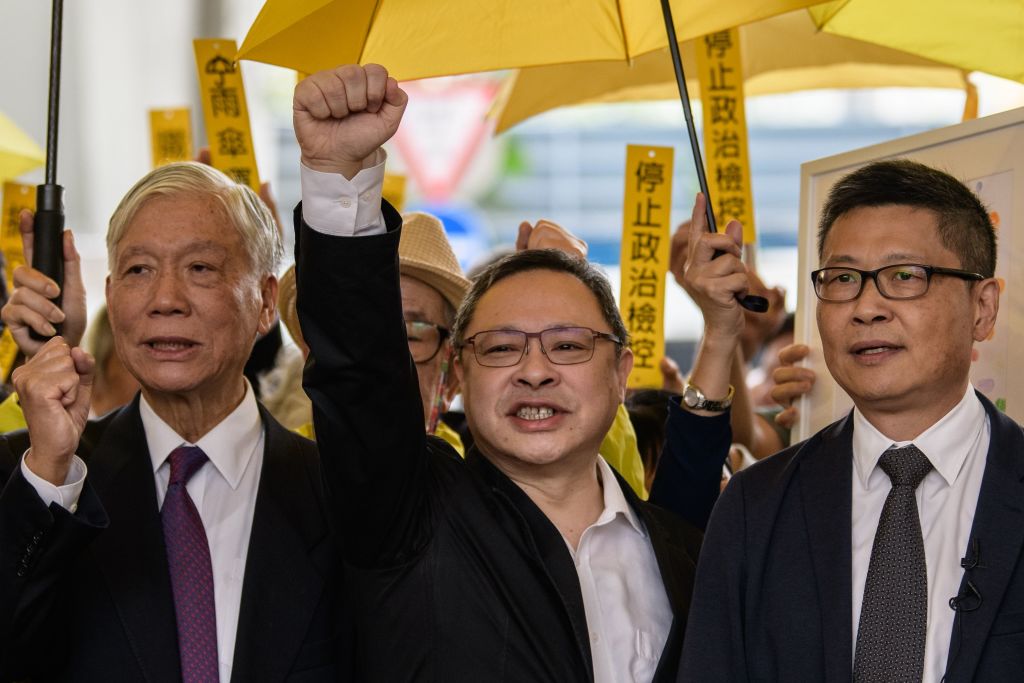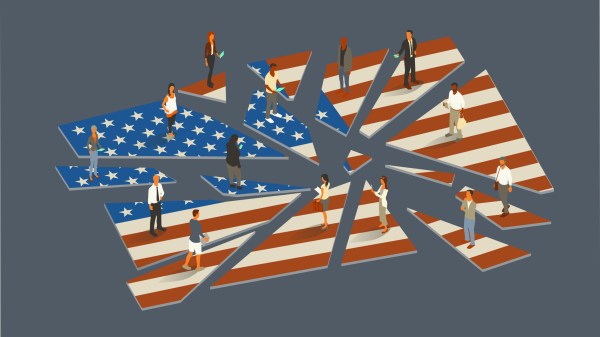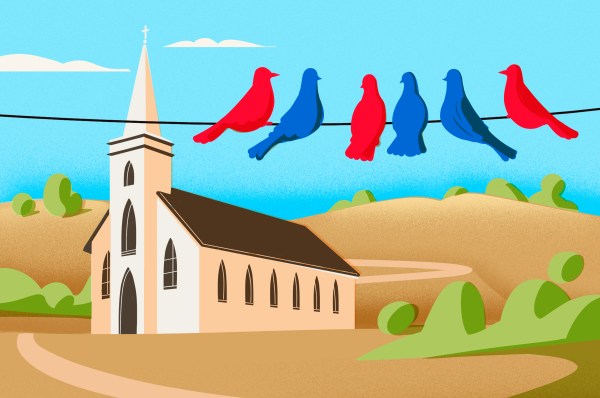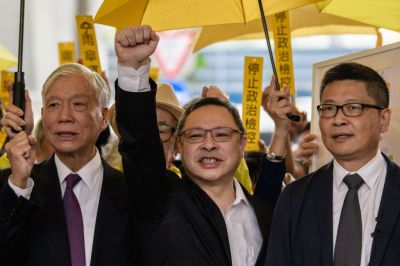Hi and happy Sunday. This week was an important one in Hong Kong. Five years ago, much of the international press was focused on protests against the Chinese Communist Party’s tightening grip on the territory. This week, courts there handed down sentences for some of the organizers of those movements and later electoral attempts to show more independence from Beijing, and resumed a trial for media executive Jimmy Lai.
What went less noticed in much news coverage was the religious faith motivating some of those leaders. Today for Dispatch Faith, Christianity Today Southeast Asia Editor Angela Lu Fulton writes about how some were motivated by their Christian faith and what a less free political landscape means for Hong Kong now.
Angela Lu Fulton: How Faith Has Propelled Hong Kong’s Freedom Fighters

It’s been a busy week for Hong Kong courts. On Tuesday, the Hong Kong government sentenced 45 former politicians and democracy activists to up to a decade in prison for conspiring to commit subversion under Hong Kong’s national security law. Their crime? Taking part in an unofficial primary election in 2020 in hopes of winning a majority in legislative elections later that year.
Then on Wednesday, Jimmy Lai, founder of the pro-democracy newspaper Apple Daily, took the stand for the first time in his foreign collusion trial, which could land him in prison for life. The 76-year-old claimed that the paper, which closed in 2021, reflected the “core values of Hong Kong … Rule of law, freedom, pursuit of democracy, freedom of speech, freedom of religion, [and] freedom of assembly.”
Sadly those core values, which British colonial rule had imbued in the territory, have vanished from Hong Kong ever since the Chinese government imposed the draconian national security law in June 2020. While once Hong Kong residents were free to protest on the streets, print newspapers and books critical of China, and hold some elections, today talk of democracy has been silenced. Protest leaders languish in prison as more than 150,000 Hong Kongers are making a new home in the U.K. Those who stay have learned to survive by keeping their mouths shut.
Within the pro-democracy movement, Christians—who make up 20 percent of the population—have played an outsized role. A number of the leading democracy activists—including Joshua Wong, Benny Tai, Chu Yiu-ming, and Jimmy Lai are professing Christians. During the 2019 protests, pastors opened their church doors to provide shelter and safety to protesters. “Sing Hallelujah to the Lord” became a prominent protest anthem as pastors stepped between riot police and protesters and sang all night to de-escalate tensions. Christians held prayer meetings, vigils, and worship gatherings.
Christianity is so influential in Hong Kong in part because during British colonization, churches were largely in charge of running schools, hospitals, and social services. Today, up to 60 percent of all of Hong Kong’s schools are run by churches.
Many of the Christians who took part in the protests—and who are now paying the price for it—have noted that their desire for democracy, their belief in justice, and their hope for the future is rooted in their Christian faith.
For instance, Joshua Wong, who at 18 became the face of the 2014 Umbrella Movement, told World magazine that growing up in a Christian family made him realize that “justice is a core value in the Bible. When I read the Bible, I realize there should be certain moral principles in this society and we must respect people’s uniqueness and their individual rights. They should not be controlled by anyone.”
Wong on Tuesday was sentenced to four years and eight months in prison. He had earlier served prison time for his involvement in the Umbrella Movement, a 79-day protest seeking universal suffrage to elect the city’s top leader, known as the chief executive. Beijing refused to budge and the Election Committee, a group of 1,200 people that skews pro-China, selected the city’s leader.
Meanwhile, legal scholar and activist Benny Tai, who was sentenced to 10 years in prison for orchestrating the primary election, wrote in his 2020 memoir Love and Peace—The Unfinished Journey of Protest that “as long as there’s injustice in society, as long as authoritarian rule still bars civil liberties, protest is putting faith into practice.”
He became a Christian while attending a church camp in college and later focused his academic research on the intersection of law and religion. “It seems that very early on, the Lord who made me and loves me already knew that at the start of 2013 I would start a political movement that’d change Hong Kong,” Tai wrote.
Along with sociology professor Chan Kin-man and Baptist pastor Chu Yiu-ming, Tai helped found Occupy Central with Love and Peace, the civil disobedience campaign that led to the Umbrella Movement. Even after Beijing stamped out any chance of free elections, Tai worked from within the system to elect more pro-democracy legislators. (In Hong Kong, residents can elect only half of the seats in the legislature, and the rest are chosen by the Election Committee). That led to his idea of holding an unofficial primary ahead of the 2020 elections to ensure the pro-democracy camp won a majority of the 70 seats. Of course, the plan was deemed illegal and 45 democracy leaders were arrested.
Tai’s Occupy Central co-founder, Chu, is the pastor of Chai Wan Baptist Church and has long engaged in political activism. Since the 1970s, he has pushed the government to improve the welfare of his impoverished neighborhood, helped Chinese university students flee after the Tiananmen Square massacre, and joined the democracy movement.
Due to his involvement in Occupy Central, in 2019 the government convicted him of public nuisance charges and sentenced him to 16 months in prison. (The punishment was suspended due to his age—then 75—and public service.) At his trial the pastor took the stand, where he talked about his conversion, quoted Scripture, and defended his God-given human rights.
“We have no regrets, we hold no grudges, no anger, no grievances,” he said in closing. “We do not give up. In the words of Jesus, ‘Happy are those who are persecuted because they do what God requires; the Kingdom of heaven belong to them!’ (Matthew 5:10)”
After the national security law passed in 2020, Chu left Hong Kong, first for Taiwan and then for Canada. A state-run newspaper had accused him of helping protesters escape to Taiwan by speedboat, an accusation that could have sent him to prison if he had stayed in Hong Kong.
Perhaps the most well-known prisoner in Hong Kong is Lai, a devout Catholic. Born in 1947 in Guangzhou, China, Lai came to Hong Kong at 12 as a stowaway on a boat and worked his way up from a child laborer at a garment factory to become the founder of the clothing chain Giordano. After the 1989 Tiananmen Square massacre, he became a vocal critic of the Chinese Communist Party and began publishing magazines and Apple Daily. The newspaper mixed tabloid sensationalism with solid journalism, never shying away from criticizing Beijing.
Lai converted to Catholicism under the influence of his wife, and according to Robert Sirico, a Catholic priest and good friend of Lai’s, he does not “come off as particularly pious. He’s a little rougher than rough.” But Mark Simon, Lai’s business associate, noted that as the protests continued and Lai’s situation looked increasingly bleak, he began to speak more about his faith.
“The way I look at it, if I suffer for the right cause, it only defines the person I am becoming,” Lai said in a 2020 interview with the Catholic Napa Institute. “It can only be good for me to become a better person. If you believe in the Lord, if you believe that all suffering has a reason, and the Lord is suffering with me. … I’m at peace with it.”
For nearly four years, Hong Kong has held Lai in solitary confinement on charges related to the 2019 protests. At his trial this week, Lai told the court that he never used his overseas contacts, including former Taiwan president Tsai Ing-wen and top US officials, to influence government policy on Hong Kong.
Many of the pastors who were involved in the pro-democracy protests have left the country, mostly for the United Kingdom. Hong Kong Pastor Wong Siu-yung is one of them—first heading to Taiwan then making his way to the U.K.—after publicly signing the 2020 Hong Kong Gospel Declaration, which called the church to stand firm amid authoritarianism. That led to state-run media claiming that he had violated the national security law.
In 2021, he noted that while from a political standpoint he had no hope left for a democratic Hong Kong, he’s not hopeless. “In the end, God has victory, this is based on the Lamb who was slain,” he said in an interview with World. “So all power, all principalities can’t exceed Jesus. President Xi says he’ll be president for life, maybe he lives for 100 years, but eventually he will also meet God.”
But in the here and now, Hong Kong has changed. The exodus of pastors, parishioners, and the next generation of Christian leaders has hit the church hard, especially as free speech tightens. Lo Man Wai, editor in chief of Hong Kong’s Christian Times newspaper, wrote in Christianity Today in March that more and more writers and sources prefer to be anonymous now. He struggles to find Christians willing to speak their mind.
For now, churches are still able to continue meeting and worshiping as long as pastors refrain from touching on politics from the pulpit. Yet Lo noted that Christians are uncertain about whether they’ll be able to continue worshiping freely in the future, or if they will be forced to meet in house churches like in mainland China.
Leaving Hong Kong is a rational choice, Lo says. But “while people can go, the church cannot.”
“There are still people in Hong Kong who need to hear the gospel and how it fulfills their spiritual, emotional, and material needs,” he wrote. “The Christian community in Hong Kong still needs information to understand the current reality and make wise judgments.
“Certainly, Christian media still has work to do here.”
The Dispatch Faith Podcast
Angela Lu Fulton joined me this week on the Dispatch Faith podcast for a more in-depth conversation about how China’s tightening grip on Hong has affected Christians, and how believers have responded. Just a reminder: Last week was the first in which we began posting these conversations our members-only podcast feed, known as The Skiff. If you want to hear those more in-depth conversations with Dispatch Faith writers, join us!
More Sunday Reads
- Former Rep. Matt Gaetz’s nomination as attorney general for the incoming Trump administration was easily one of the most controversial developments since the president-elect’s victory earlier this month. On Thursday, Gaetz withdrew his nomination after it became clearer his pathway to confirmation would in no way be smooth. In light of the House ethics investigation into Gaetz and allegations that he both had sex with at least one minor and may have been involved in sex trafficking, several Christian anti-trafficking groups came out against Gaetz’s nomination, as Emily Belz reported for Christianity Today. “Shared Hope International, a Christian anti-trafficking organization founded by Republican congresswoman Linda Smith in 1998, stated that Gaetz should not be confirmed until the House Ethics Committee could clear him of sex-trafficking allegations. ‘The office of attorney general requires the highest ethical conduct and public trust,’ said Smith, who serves as CEO. Shared Hope also signed a letter organized by anti-trafficking group World Without Exploitation which will be sent to the Senate Judiciary Committee from dozens of anti-trafficking organizations opposing Gaetz’s confirmation. More groups are still signing onto the letter. The signers included faith-based anti-trafficking groups like Exodus Cry, Imago Dei Fund, Sacred Beginnings, and The Genesis Project, as well as a cornucopia of others—from more liberal feminist groups like National Organization for Women to a motorcycle group (Ride My Road) that raises money to fight trafficking. ‘The nomination of Mr. Gaetz sends a signal to the country and the world that sexual misconduct and exploitation and corrupt behavior will not only go unpunished, but will be rewarded,’ the groups wrote. ‘It is a signal to sex traffickers around the United States to continue exploiting the most vulnerable for their own profit with no consequences.’”
- Our own Charlotte Lawson profiled Donald Trump’s choice as ambassador to Israel: former Arkansas Gov. Mike Huckabee. He’s certainly an interesting pick. If confirmed he’ll be the first non-Jewish U.S. ambassador to Israel in more than a decade. His theological views on the nation of Israel will certainly make him a stalwart ally of the Jewish nation, but they also bring their own controversy, as Charlotte reports. “For most of his life, Huckabee’s evangelical Christian beliefs have shaped his view of Israel as a state given by God to the Jewish people. As a minister in Pine Bluff, Arkansas, Huckabee began bringing small groups of congregants to the country in the early 1980s. Over the next four decades, the Christian pilgrimages grew along with Huckabee’s name recognition, as he became involved in broadcasting and eventually politics, serving as governor of Arkansas for two-plus terms and launching two unsuccessful bids for the Republican presidential ticket, in 2008 and 2016. Hundreds of devotees from across the U.S. now join the Huckabee host on near-annual treks to the Holy Land, which include stops at biblical sites like the Sea of Galilee and the Mount of Beatitudes.” That could have a profound impact on U.S. policy toward Israel and the wider region. “But Trump’s decision to nominate Huckabee as ambassador to Israel has raised concerns among even the country’s most ardent supporters, who view the former governor’s rejection of Palestinian self-governance as a potential impediment to future peace talks. Huckabee openly opposes a two-state solution—a stance that runs contrary to the official U.S. position—and backs further Israeli settlement of the West Bank, though he wouldn’t refer to it as such. ‘There are certain words I refuse to use. There is no such thing as a West Bank—It’s Judea and Samaria,’ Huckabee said during a 2017 visit to an Israeli neighborhood in the Palestinian territory, using the biblical names for the area. ‘There’s no such thing as a settlement—They’re communities, they’re neighborhoods, they’re cities. There’s no such thing as an occupation.’ He has also been quoted as saying, ‘There’s really no such thing as a Palestinian’ and describing the identity as a ‘political tool’ to ‘force land away from Israel.’
- Not all evangelical Christians interpret the Bible in such a way was to place such theological importance on the current state of Israel. But historian Thomas Kidd explained why some do in a piece we published in November 2023. It’s well worth a read to understand Huckabee’s views.
A Good Word
How many Shabbat-observant Jewish college football players have you heard of? I bet not many. But Texas A&M senior wide receive Sam Salz made his on-field debut on November 16—after sundown—in a moment many are celebrating, as Jacob Gurvis reports for the Jewish Telegraphic Agency: “Salz did not appear in a game last year. But he never lost his motivation, telling The Athletic that he felt he was playing for more than just himself. ‘I know why I’m doing it: for my Jewish brothers and sisters,’ Salz said. ‘I knew I’d be in a position to inspire a lot of people.’ Jewish fans celebrated Salz’s debut — with one going so far as to compare the moment to Hall of Fame pitcher Sandy Koufax’s exploits. ‘Next to Koufax’s perfect game, this is the greatest night in Jewish sports history,’ Richard Zane, who covers the Aggies, wrote on X, referencing the pitcher’s legendary 1963 outing.”





Please note that we at The Dispatch hold ourselves, our work, and our commenters to a higher standard than other places on the internet. We welcome comments that foster genuine debate or discussion—including comments critical of us or our work—but responses that include ad hominem attacks on fellow Dispatch members or are intended to stoke fear and anger may be moderated.
With your membership, you only have the ability to comment on The Morning Dispatch articles. Consider upgrading to join the conversation everywhere.